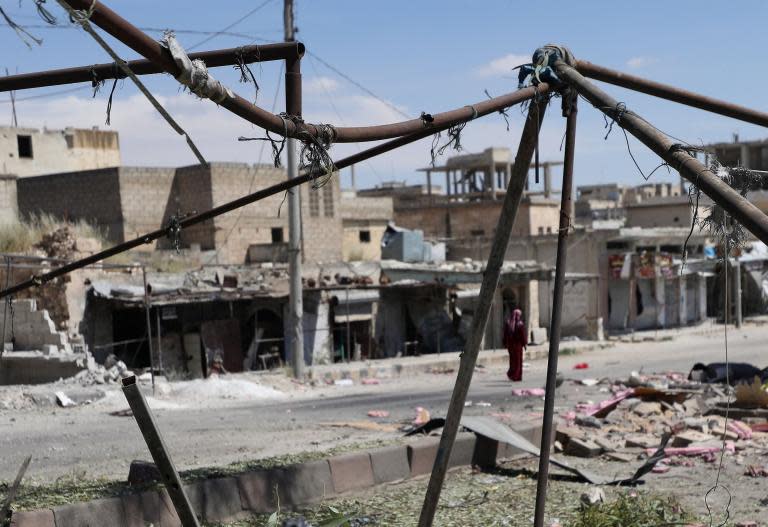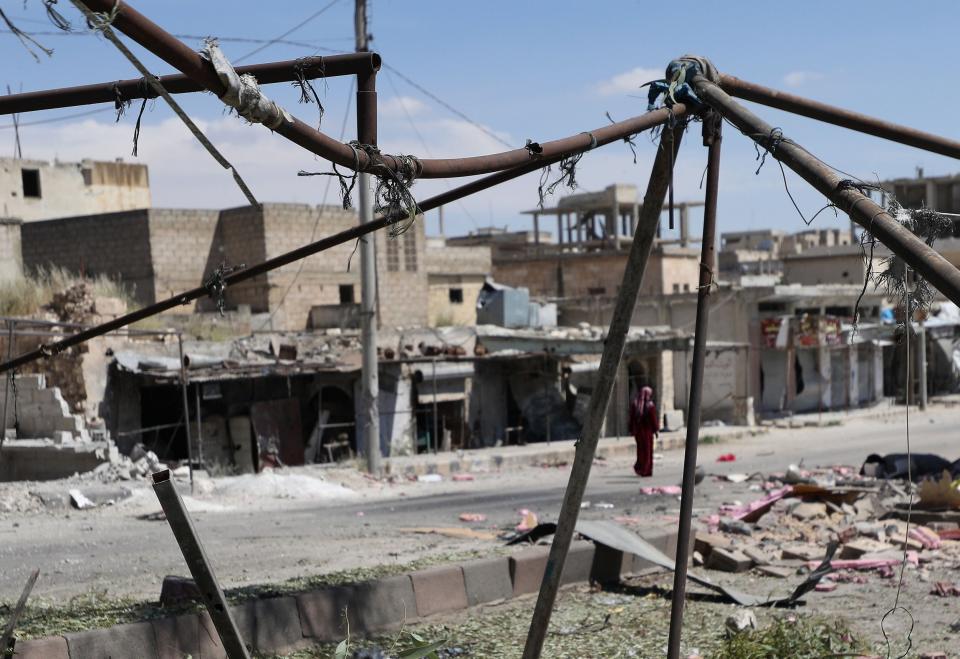US warns Syria of quick response if report of new chemical attack by Assad regime is proven
The United States has raised the prospect of carrying out more airstrikes against Syria following reports of a new chemical weapons attack by the Syrian army.
The alleged incident was reported by local activists and doctors on Sunday near the town of Kbanah, close to the frontline of a Syrian government offensive in the country’s northwest that has been raging for nearly a month.
The State Department said it would respond “quickly and appropriately" if the latest allegation of a suspected chlorine attack by Bashar al-Assad’s forces was proven.
"Unfortunately, we continue to see signs that the Assad regime may be renewing its use of chemical weapons, including an alleged chlorine attack in northwest Syria on the morning of May 19," State Department spokeswoman Morgan Ortagus said in a statement on Tuesday.
"We are still gathering information on this incident, but we repeat our warning that if the Assad regime uses chemical weapons, the United States and our allies will respond quickly and appropriately," she said.
Theresa May also told parliament on Wednesday that she had been in close contact with the US about the alleged attack and that the UK would respond "appropriately" if it was confirmed.
The Syrian army, backed by Russia, launched an offensive against the last rebel-held province of Idlib last month. Dozens of civilians have been killed by government airstrikes and shelling during that time, and more than 18 hospitals have been put out of action by bombing.
Despite the use of heavy airpower and artillery resulting in heavy civilian casualties, the government offensive has made little ground. But that may not remain the case for long.
Idlib represents the last area held by the armed opposition to Bashar al-Assad’s rule after the defeat of the fragmented rebels in the south of the country, and has been the government’s primary target for more than a year. The province is controlled by a coalition of rebel groups led by a formerly al-Qaeda-linked group, which has been joined by Turkey-backed fighters to defend against the government push.
US officials have suggested that the ferocity of the fight in Idlib could have prompted the Syrian government to use chemical weapons, as it has done before.
The Syrian Civil Defence, an organisation which deploys rescue workers in rebel-held territory, said four people were injured in Sunday’s attack after the Syrian army targeted the area with three shells that emitted a “greenish yellow cloud”.
“The rockets did not explode, and the people who were in the area started to suffer from breathing difficulties, tiredness and loss of balance,” said a statement from the group.
It added that a “specialised team” took samples from the scene and to give to the Organisation for the Prohibition of Chemical Weapons (OPCW) – the UN body responsible for investigating chemical weapons attacks.
The Chemical Violations Documentation Centre of Syria, a Belgium-based organisation which has worked with the OPCW on previous investigations, told The Independent that doctors it had interviewed confirmed treating patients with symptoms consistent with exposure to chemical toxins, and that an investigation was ongoing.
Whether the confirmed use of chlorine will prompt a US military response is unclear. The Trump administration has twice bombed Syria over Assad's alleged use of chemical weapons, in April 2017 and April 2018, but both of those strikes came in response to chemical attacks that killed large numbers of people, in the towns of Khan Sheikhoun and Douma respectively.
The Syrian government denied using chemical weapons in both instances, but subsequent independent reports pointed the finger at Syrian forces.
An investigation by the OPCW into the Khan Sheikhoun deaths found that the Syrian government was responsible for an attack using the deadly chemical sarin. A separate OPCW investigation into the Douma attack, which was not mandated to attribute blame, nonetheless found that chlorine canisters dropped from above were to blame for 43 deaths – effectively ruling out a staged attack by rebel forces, which do not possess aircraft.
The State Department statement accused Russia and Assad's forces of "a continuing disinformation campaign ... to create the false narrative that others are to blame for chemical weapons attacks."
A recent report by the Global Public Policy Institute found that there had been at least 336 chemical weapons attacks over the course of the Syrian civil war, around 98 per cent of which were attributable to the Assad government.
“The Syrian military’s chemical warfare campaign is closely intertwined – logistically, operationally and strategically – with its campaign of conventional warfare,” the report noted.
It added that the Syrian government’s “persistent and widespread use of chemical weapons is best understood as part of its overall war strategy of collective punishment of populations in opposition-held areas. Chemical weapons are an integral component of its arsenal of indiscriminate violence, alongside sieges and high-explosive weapons.”

 Yahoo News
Yahoo News 

